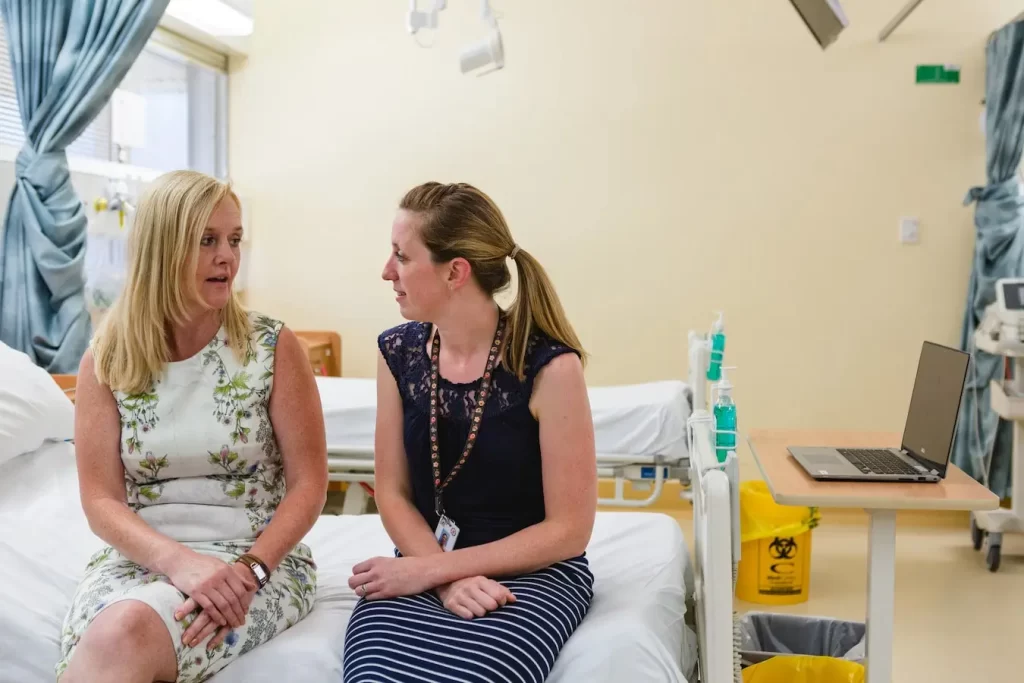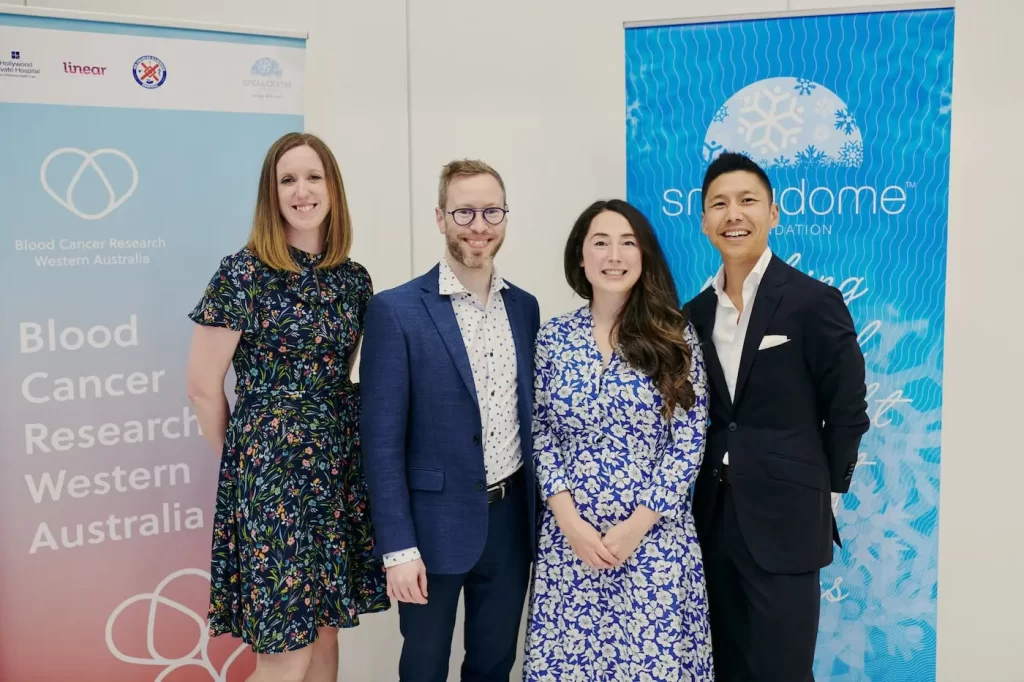An interview with Blood Cancer Research’s Clinical Research Fellow, Dr. Katharine Lewis, discussing her latest milestone publication in esteemed Journal of Clinical Oncology.
Dr. Katharine Lewis Achieves Milestone: Publication in Prestigious Journal of Clinical Oncology

Dr. Katherine Lewis (left) interviewing clinical trial patients, John Cater (middle) and Cornelia De Villiers (right), in October 2022.
Katharine L. Lewis , BMedSci, MBBS (Hons); Lasse H. Jakobsen, PhD, MSc; Diego Villa, MD, MPH; Karin E. Smedby , MD; Kerry J. Savage, MD, MSc; Toby A. Eyre, MD, MBChB; Kate Cwynarski, MD, PhD; Mark J. Bishton, PhD, MBChB; Christopher P. Fox, MD, PhD; Eliza A. Hawkes, MBBS(Hons), DMedSci; Matthew J. Maurer, MS, DMSc; Tarec C. El-Galaly, MD, DMSc; and Chan Y. Cheah, MBBS, DMSc; on behalf of the International CNS Prophylaxis Study Group
Amidst Dr. Katharine Lewis‘ busy schedule of caring for clinical trial patients and leading ground-breaking new research, we found some time to talk about her most recent accomplishment – a publication in the renowned Journal of Clinical Oncology.
Congratulations on your recent publication! Can you briefly describe the focus of your research and its potential impact on the field of haematology?
Thank you! The study is a large international research project investigating whether a chemotherapy drug called methotrexate is effective in preventing a complication in lymphoma. It has been widely used to try to prevent the spread of lymphoma to the brain and spine, for people with some types of lymphoma who are at high risk of this, since this can be a life-threatening complication and very difficult to treat effectively once it has occurred.
However, before our study there has been insufficient evidence to conclusively demonstrate whether this is effective, and methotrexate can cause significant short and long-term side effects. We led this large research study in almost 2500 patients to further investigate it’s effectiveness. Our study showed that methotrexate was not effective. The results have already altered the way doctors treat lymphoma around the world, with many doctors now electing not to use methotrexate in their treatment.
What inspired you to purse this research topic, and what challenges did you encounter during the process?
Spread of lymphoma is a devastating complication and can be very challenging to treat effectively if it occurs, so preventing it is a priority in patients who are at high risk. However, the prevention treatment can cause complications itself, and there is limited evidence to support it’s effectiveness.
There is actually a lot of great research that has already been done in this area, but since spread of lymphoma to the brain/spine is very rare, in order to definitively show whether a preventative treatment is effective or not, studies need to include very large numbers of patients.
To date, before our study, none of the available research contained large enough numbers of patients to draw conclusions, which gave us the idea to reach out to other lymphoma doctors to lead a large worldwide collaboration so that we could investigate this in a large enough group of patients, to better understand whether methotrexate is effective or not.

Dr. Katharine Lewis caring for a clinical trial patient, 2020
How did your experience at Blood Cancer Research contribute to the success of your project? Were there any unique opportunities or research that you had access to?
Working with Chan in Blood Cancer Research on this project was invaluable, as he has led previous research in this area and has many international collaborators from other research that we were able to invite to join our study. I was also able to learn from his extensive research experience, knowledge in the field, experience of designing research studies and the process of publishing research.
Undertaking this study while working in a combined clinical and research role has also meant that I’ve been able to dedicate more time to the research than if I had undertaken the project while working in a purely clinical role, and the structure of the Blood Cancer Research WA clinical fellow role which has evolved since I begun, has provided this opportunity.
In your opinion, what were the most significant findings of your research, and how do you envision these findings being applied in clinical practice or further research?
As described earlier, methotrexate was not effective at preventing the spread of lymphoma to the brain and spine, and many doctors around the world have since abandoned this practice.
Important areas for further research include to investigate and understand further whether there are any specific high-risk lymphoma situations where methotrexate may still be effective that were not highlighted by our study, and to investigate whether there are other treatments may be effective instead of methotrexate, or new tests that may be able to detect the brain/spine lymphoma spread at an earlier time to be able to treat it more effectively.
Were there any unexpected or surprising results in your study? How did you address them?
When we started the study, we anticipated that the results would show that methotrexate was effective, and had been using this treatment for many years! Even in patients at the highest risk, where we would have anticipated methotrexate to be effective if anywhere, we found no benefit to giving methotrexate. So you can imagine it was very surprising to discover the results as we undertook this study! Our statistician performed a number of different and very detailed analyses to understand and confirm these results.

Pictured (left to right): Dr. Katharine Lewis, Dr. Ross Salvaris, Dr. Elizabeth Smyth, Prof. Chan Cheah, in October 2022.
As a clinical research fellow, you likely engage in both clinical work and research. How do you find a balance between these two aspects, and do you have any advice for others aspiring to excel in both these areas?
This is a great question! I love both aspects of my job; I love being with patients in person, and helping them through their journey with blood cancer and it’s challenges, and especially love being able to offer emerging new treatments to those most in need, when standard treatments have not worked as we would have hoped.
Although the treatments don’t work for everyone, it is such a joy to see some of these new treatments, even sometimes those very early in development, have life-changing impact for many patients who would have likely died from their blood cancer without access to these therapies.
Alongside clinical work, being involved in other research is extremely rewarding. I hadn’t really been involved in research before my role as a clinical fellow, and it has been a learning curve to understand and develop the different skills compared with clinical work, and a challenge to make time for both aspects of the role.
My main advice would be;
- Patients need us, so prioritise clinical work, but try to look ahead each week and set aside allocated time for research, where you anticipate clinical work will not need urgent attention, and try to have some back-up time in case things don’t go as expected! With planning, this is usually doable.
- Be prepared to work hard – but schedule non work times where you can recharge and refresh, otherwise there will always be more work you can do!
- Communicate clearly and regularly with those you collaborate with on your research.
- Speak to several people who have shared clinical and research roles so that you can discover different approaches to balancing these.
- When starting out in particular, to take as many opportunities as you can when offered (without overcommitting!), even if an opportunity seems daunting – it can be hugely rewarding and you will look back and realise later how much you learned and developed from the challenge, as well as the value of the contributions to your field.
